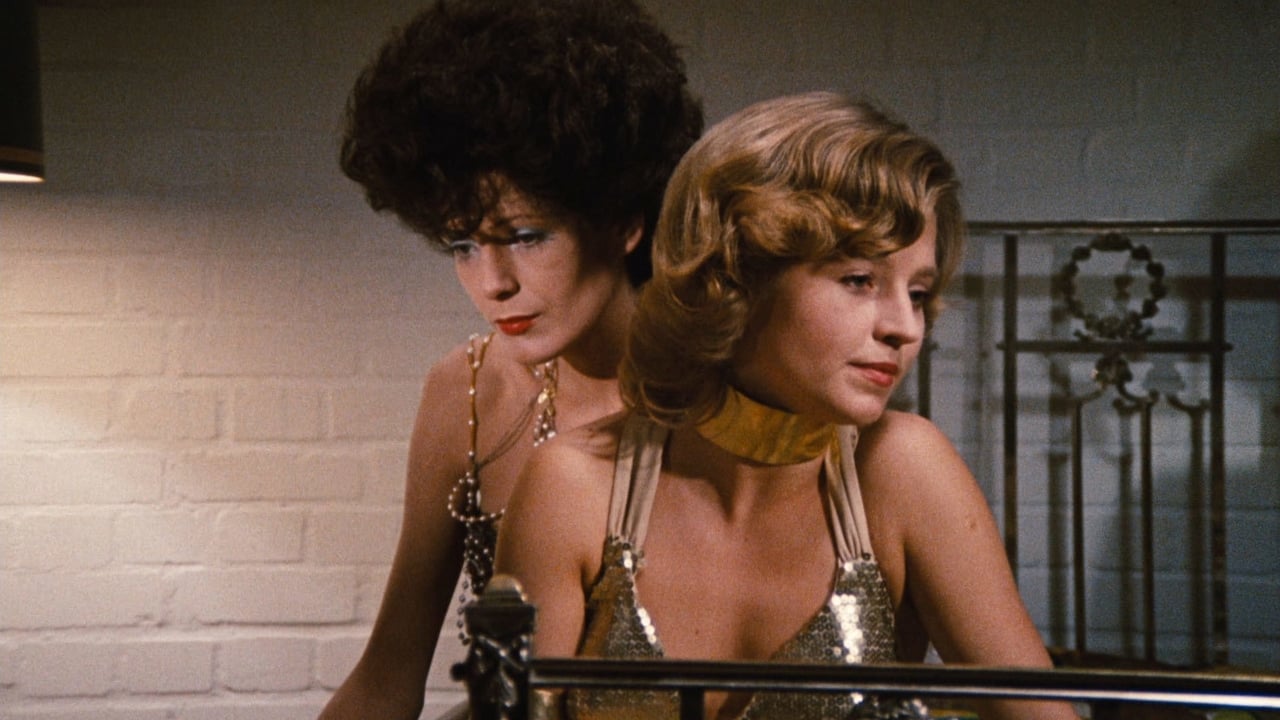

***User-reviewer Alice Liddel ("A searing reminder of what a galvanising experience cinema could be.", Alice Liddel from dublin, ireland 26 March 2001) has an excellent review. Also, Markboulos ("Fassbinder at his finest! Cinema at its finest!", markboulos from Brooklyn, NYC, 3 February 2000) captures the film's quality. Shane James Bordas ("Key Film From The German Master", Shane James Bordas from United Kingdom, 22 August 2006) describes the film's origins. Finally, Lexo-2 ("Great film, glad I don't live there", Lexo-2 from Dublin, Ireland, 1 May 1999) has a nice summary.***"The Bitter Tears of Petra Von Kant (1972, Rainer Werner Fassbinder ), a ladies-only slumber party, is a slow-paced masterpiece from the renowned German filmmaker. Adapted from Fassbinder's own play, it is set in a single apartment. It consists entirely of conversation that is spoken by world-weary characters. While it will likely bore many casual film-goers, it is a sublime achievement for those willing to stick it out. "Bitter Tears" is very profound and informs on the human condition in various ways.The titular character, Petra (Margit Carstensen), is a celebrity fashion designer. Petra is used to emotionally dominating the people who surround her. Having been married twice before, Petra explains to her visiting cousin Sidonie (Kartin Schaake) that men now repulse her and women are currently her romantic gender of choice. ("Bitter Tears" shows us a lesbian triangle which seems unusually bold for 1974.) Petra employs a silent servant named Marlene (Irm Hermann) that she continually mistreats. Because Marlene is obviously in love with Petra, her quiet suffering is mesmerizing to observe. (BTW, Fassbinder leaves two essential questions about Marlene unresolved: 1) Is she a mute or just unable to speak in Petra's presence? 2) Is she entirely or partly responsible for Petra's professional success? Leaving Marlene's relationship with Petra ambiguous is an example of Fassbinder's elite skill at story-telling.) Through Sidonie, Petra meets attractive Karin (Hanna Schygulla). Karin is separated from her husband. Petra immediately falls for her. She tells Karin she has a future as a fashion model. When Karin arrives for a second visit, Petra assumes her customary role as sexual predator. While treating Marlene miserably, Petra tries to seduce the seemingly confused Karin. Unexpectedly, Karin is the real shark. We learn she is taking advantage of Petra. Karin will ultimately stick an emotional dagger through Petra's soul, rejecting her and torturing her before revealing she is returning to her husband. Realizing the consequences of opening one's heart at the wrong place and time, Petra falls apart. On her birthday, Petra has a nervous breakdown which is witnessed by Sidonie, along with Petra's Mother and Daughter.While interpretations of this film vary, Fassbinder is said to be showing how a group of people can all simultaneously reside in their own mental prisons. He's also employing substitution on many levels. The characters here are all drawn from Fassbinder's relationships with his recurring cast members as well as his conservative mother. As a celebrity designer, Petra is an obvious stand-in for Fassbinder himself. The silent Marlene is regarded as representing the audience early, and later, Karin. (Fassbinder reviewers have noted in other films he uses female characters as substitutes for real-life men he knows.)Visually, Fassbinder is electric. He is always on point with his imagery; even though this is a low budget production. On the apartment wall there is "a large reproduction of Poussin's Midas and Bacchus (c.1630), which depicts naked and partially clothed men (Wikipedia)." As Petr describes her sexual preference for women to Sidonie, the audience will have little difficulty in discovering the (sleeping) endowment of Poussin's central nude male in the background. Petra's words and the Poussin figure's little man seems to be Fassbinder describing his own homosexuality. Even though a homo-erotic painting is often present, and a lesbian triangle is in the story, "Bitter Tears" has enough mild eroticism for every individual audience member, regardless their preferred sleeping arrangement. ("Bitter Tears" arrives decades before the Internet confirms the interest hetero guys have in watching lesbians.)Fassbinder favorite Hanna Schygulla is adorable as the femme fatale. Meanwhile, Margit Carstensen (Petra), also attractive, turns in a superb performance as Petra. (She won awards in Germany, but inexplicably she was not internationally recognized.)The origin of "Bitter Tears" is legendary. Fassbinder is said to have written the screenplay on an 11-hour plane trip from Germany to L.A. Upon landing, he immediately ordered his film crew (which traveled with him) to return to Germany where they made it in 10 days. This is all astonishing because many reviewers regard "Bitter Tears" as Fassbinder's crowning achievement.Cinephiles with some patience should not miss this Fassbinder classic.
... View MoreFrom director Rainer Werner Fassbinder (Fear Eats the Soul), the book 1001 Movies You Must See Before You Die has provided me with plenty of films I am keen to see, and this one from Germany is one of them. Basically the film restricts us to staying inside the apartment of successful fashion designer Petra Von Kant (Margit Carstensen), who is arrogant, caustic and self-satisfied, and this includes being rude and constantly ordering about her secretary, maid and co-designer Marlene (Irm Hermann). Petra is being visited by twenty three year old Karin Thimm (Hanna Schygulla) who wants to be a model, but as they get to know each other in their time together they seem to fall in love, and she asks her new love interest to move in. We see the affair continue on until Karin walks out, and we see Petra turn into an emotional wreck, on her birthday in front of her friends and family, they all leave her to wallow in self pity, Marlene finally decides she has had enough, and Petra is left alone sobbing. Also starring Katrin Schaake as Sidonie Von Grasenabb, Eva Mattes as Gabriele Von Kant and Gisela Fackeldey as Valerie Von Kant. Carstensen gives a great performance as the beauty who seems to only care about herself, getting everything she wants and attempting a lesbian relationship that goes wrong, the story is based on the director's own personal experiences as a homosexual, and with inspiration from All About Eve, it is unusual viewing and did not fully make sense at all times for me, but overall it is a rather interesting melodrama. Very good!
... View More"The Bitter Tears of Petra von Kant" (1972) - was the first Fassbinder's film I saw many years ago in Moscow and it had started my fascination and interest in the work of the enormously talented man who was a writer/director/producer/editor/actor for almost all his movies. "The Bitter Tears of Petra von Kant" is a screen adaptation of the earlier Fassbinder's play and it never leaves the apartment of Petra Von Kant, an arrogant, sarcastic, and successful fashion designer who constantly mistreats and humiliates her always silent and obedient assistant Marianne (Irm Hermann, with whom Fassbinder made 24 movies). As a background for Petra's apartment, Fassbinder uses the blowup of Poussin's painting "Midas and Bacchus." The use of the mural is ironic on more than one level. Nude Bacchus stands in the center of the mural and is the only male presence in a film populated entirely with women. Petra, not unlike legendary Midas wished for herself a golden girl, young and beautiful Karin with golden hair (Hanna Schygulla, another Fassbinder's muse with whom he made over 20 films). As with Midas from legend, it turned to be a huge mistake for Petra who learned herself what abuse, indifference, and humiliation meant. With just a few characters locked in the claustrophobic and suffocating atmosphere of the apartment, the film is never slow or boring thanks to the young director/writer story-telling ability and to magic camera work by Michael Ballhaus ("Goodfellas", "The Last Temptation of Christ", and "After Hours" among others). It is hard to believe that such a gorgeous looking movie was shot for ten days only. I've read that Fassbinder was able to make so many movies in such a short period of time because they were cheaply produced - no special effects, no big action scenes, no exotic locations. This is true but his movies are most certainly not cheap - highly intelligent, thought provoking, always excellently acted and beautiful or perhaps I've been lucky and have not seen the ones that don't fit the description.9.5/10
... View MoreSome abstract painters who don't have the patience and dedication to learn how to paint correctly and resort to modern painting. And try to prove it's a better way to express themselves.The performance and directing have nothing to be desired. I can't relate to Petra, who whines and moans for no particular reason.It leaves a bitter taste in my mouth.
... View More